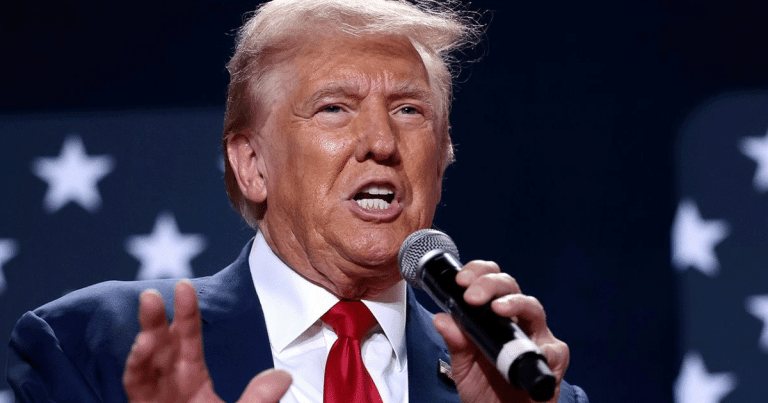
The left’s war on religious freedom in America has intensified in recent years, as Democrats in both local and national office increasingly prioritize progressive agendas over First Amendment rights.
From restrictive mandates that infringe on places of worship to public policies that dismiss the beliefs of faith-based organizations, religious Americans are feeling the pressure. The message is clear: when it comes to a choice between protecting religious freedoms and enforcing radical policies, the left is more than willing to sacrifice the former.
However, Donald Trump has stepped up, promising to reverse these trends and reestablish protections for Americans of faith. Speaking at the National Faith Summit in Powder Springs, Georgia, on Monday, Trump emphasized his commitment to religious liberty, pledging to bring back the Faith Office he created during his first term.
His announcement has given hope to millions who feel sidelined in a cultural climate increasingly hostile toward religious values. Trump’s vision for America includes restoring respect for religion and defending the rights of believers nationwide.
From Washington Examiner:
Former President Donald Trump has vowed to give faith leaders a direct line of access to him in the Oval Office should he be elected next week.Trump promised in an interview at the National Faith Summit in Powder Springs, Georgia, Monday afternoon that he would reinstate the Faith Office that he created during his first term in office, touting the importance of religion in the United States.
Trump’s Plan to Reinstate the Faith Office
At the summit, moderator Paula White-Cain, a longtime advisor and founder of the National Faith Advisory Board, asked Trump about his plans to support religious Americans if re-elected.
His answer was firm: a renewed focus on faith and a reinstated Faith Office right in the Oval Office. Trump assured the audience that this office would not just be ceremonial; it would be directly tied to the highest levels of decision-making. “It’s important, and it’ll be directly into the Oval Office,” he said.
Trump’s Faith Office, first established during his 2017–2021 term, was designed to amplify the voice of religious leaders and ensure that religious communities could navigate federal programs without compromising their beliefs.
Although President Joe Biden reinstated a similar office in 2021, Trump and his supporters argue that the Biden administration’s version lacks the proactive advocacy for religious freedom that was central to Trump’s original Faith Office.
“We Have to Save Religion in This Country”
In Trump’s view, faith isn’t just a personal practice—it’s the “fabric of our country.” He shared how his own upbringing, attending church and Sunday School in Queens, New York, and later worshiping in Manhattan, shaped his appreciation for America’s faith-based foundations.
Addressing the crowd on Monday, he said, “Religion is under threat in this country, serious threat, and we can’t let that happen.” For Trump, religious freedom isn’t merely a talking point; it’s a battle worth fighting as a cornerstone of American values.
With the Biden administration pursuing policies that often clash with the beliefs of religious communities—such as mandates on hiring practices for faith-based organizations and schools—many Americans feel that religion’s influence in public life is under siege.
Trump’s stance on protecting these rights resonates with millions who feel their beliefs are constantly dismissed or undermined by an increasingly secular left-wing agenda.
Faith Advisory Board to Play Key Role in 2024
Trump’s strategy to protect religious freedom is bolstered by a strong support team, including Dr. Ben Carson, who was recently appointed national faith chairman for Trump’s 2024 campaign.
Dr. Carson, a former housing and urban development secretary and a man of deep personal faith, has long been an advocate for the rights of religious Americans. Carson’s experience and moral authority are assets for the campaign, as he’s well-regarded among many faith communities for his principles and leadership.
Paula White-Cain, who played a crucial role in Trump’s previous Faith Office, is another trusted ally Trump will likely rely on to guide his faith initiatives. White-Cain, a Pentecostal pastor, was tasked in 2020 with managing faith-based outreach and navigating the administration’s relationship with religious organizations.
Her leadership and influence continue to be a vital part of Trump’s outreach to communities of faith, bridging a gap that many feel has been widened by the left’s policies.
The Importance of Religious Freedom in 2024
The upcoming 2024 election brings religious freedom issues into the spotlight, with many conservative Americans concerned about the left’s vision for the future. Public schools where prayer and expressions of faith are stifled to business regulations that force religious employers to violate their beliefs.
Trump’s supporters see him as a defender against what they view as an overreaching secular agenda. Trump’s message to these voters is straightforward: religious Americans should never have to compromise their beliefs to engage in public life.
For religious voters, Trump’s promise to reinstate the Faith Office represents a beacon of hope. While the Biden administration claims to support religious freedom, its policies often favor secular values over faith-based principles.
Trump’s approach offers a distinct contrast, one that prioritizes the First Amendment over progressive social mandates. In Trump’s words, “We’re not going to lose religion.” This commitment resonates with voters who are deeply concerned that the left’s policies are eroding the freedoms that once defined the nation.
Key Takeaways
- Trump promises to reinstate the Faith Office, emphasizing his commitment to protecting religious freedom for all Americans.
- His renewed focus on faith-based initiatives resonates with conservative Americans wary of left-wing policies.
- With leaders like Dr. Ben Carson and Paula White-Cain, Trump’s 2024 campaign positions itself as a champion for religious liberty.
Source: Washington Examiner